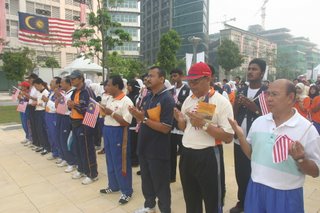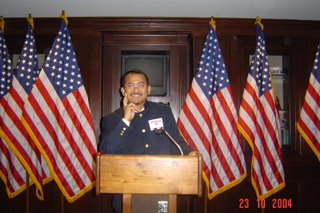By: Kamar Oniah Kamaruzaman (Ph.D)
Introduction
In this globalized and cosmopolitan world of today, inter-faith or inter-religious dialogue is no longer a commendable enterprise but a necessity. Communication technology has made it so. Communication technology has taken away boundaries and borders that there is no longer a need for the application for passports and visas, and airplane hassles, to gain access to someone across the globe. People learn from each other at a click of a button. People learn from, and people share with, each other, and so revised their personal views, and ultimately their personal culture. Personal culture got translated into social culture. The result is what we see around us today, that there is no longer a particular culture; there is just one culture, and that culture is the global culture. This may be viewed with suspicion by some, if not many. Still, this seems to be the trend the future will take.
If such is the nature of the future, then it is wise to prepare for it. The better prepared we are, the better we will be able to handle the course of events. Paramount in the fear of nations and communities, particularly the smaller ones, is the possibility of being swallowed up into non-existent by the bigger and more powerful powers-that-be, swallowed into the globe of their making. Since avoiding the inevitable is not possible, it is necessary, therefore, for nations and communities to exert themselves to be part of the global scenario, not as a non-entity but as an obvious part of the whole, to participate and be involved in the making of that global culture. Herewith therefore is the role of inter-faith dialogue. Religious communities ought to exert their identity and values to be part of the plan-setters and agenda makers, so to speak, of the global culture.
Obstacles to Inter-faith Dialogue
Yet all is not plain sailing in the arena of inter-faith dialogue. There is as much fear, and so reluctance, to participate in inter-faith dialogue as there is the necessity for it. The fear may be genuine, or maybe unreal – yet it is there. Numerous efforts attempted for dialogues on religions usually received luke-warm support and are especially disheartening at the local levels. There is a kind of phobia or taboo surrounding participation in inter-faith activities. The reasons for this are many, some of which can be listed as follows:
1. Conversion - the fear that one may get converted into the faith of the dialogue partners.
2. Dilution of faith - the suspicion that influential arguments in the dialogue may dilute one’s faith or previous stance.
3. Defensive – the apprehension that one may hear something unpleasant or discomforting about one’s religion in dialogue sessions.
4. Embarrassment – the anxiety that one may be embarrassed at dialogue sessions if one fail to expound one’s religion well enough.
5. Disservice – the worry that one may do a disservice to one’s religion if one fails to explain or defend it properly.
6. Inferiority complex – the nervousness if one will be good enough to enter dialogues.
7. Social innuendoes – the feeling of discomfort that fellow adherents may suspect one’s commitment to one’s religion if seen to associate with adherents of other religions.
8. Political implications – the hindrances that some governments or institutions may pose for inter-faith dialogues and activities.
9. Taboos – the presence of superstitions or popular belief that involvement in dialogues or visiting houses of worship of other religions may cause some misfortunes.
10. Suspicion – the mistrust over the motive and direction of the dialogue programmes and the sincerity of dialogue partners and the organisers.
11. Political agenda – the dread that one may be lured, or tricked, or even compelled into supporting political agenda detrimental to the good and wellbeing of one’s religion and community.
12. Historical nightmares – the memories of unpleasant histories, far and near, of painful encounters with certain religious communities.
There are merits indeed in the concern and suspicions above since every religion and religious community have unhappy stories to narrate about unpleasant encounters, past and present, that cannot be easily erased from the minds of the committed. No religion or religious community had been insulated from rude and rough, and even catastrophic, onslaughts from outsiders. Even subtle tricks and proselytising can be just as disturbing. Likewise, no one religious community had not been involved in some form of aggression towards another, directly or indirectly. As such, no one religious community needs to demand for apology from another, as no one religious community is obliged to apologise to another either, for all and sundry had been a victim and an aggressor by somebody, or to somebody, somehow, sometime, somewhere, in various forms and degrees. Yes, histories of encounters can indeed be nightmarish and painful.
Yet there were also those happy times that history relates about happy events of rapport and co-operation, of how learning and sharing had effervesced and crystalized into human civilisation, benefiting one and all, communities and nations alike. It is indeed in the nature of human beings to learn and share and reproduce and upgrade - hence the flowering and blossoming of civilisations.
We therefore have a choice – to either dwell into unhappy memories, or to focus on the building up of a brighter future for religions, for our own religion, in particular. Such is the nature of this worldly existence that withdrawal, segregation and insulation will lead into oblivion and death. In this world of the fast track today, already religion is falling into the background. If left as it is, then the further it will retreat. People of religion and religious concern should therefore brace ourselves up and come to the fore to propagate and promote our religions, to put religion back onto its rightful place in this globalised, material intoxicated world of today, to bring back the balance into our human lives once again. Indeed, not only is religion necessary for human life, even the environment is crying out for its attention.
Therefore, people of religion must be heard and be seen all the way up into powerful policy making bodies. The recent Millennium Peace Summit of the United Nations is one heartening example. It was a start but much more can be added to it to make it more effective and representative. More ground works need to be done and among the most pressing and fundamental of these is the need to promote inter-faith dialogues at various levels. For such effort as this to be well received, and subsequently be accepted and so become effective, it is necessary to formulate the premises and paradigms, the objectives and ethics of inter-faith dialogues. Otherwise, interest and reception will be poor and our good intention and hard work will come to naught.
Formulating Dialogue
In formulating inter-faith dialogue, it is necessary to recognise the fact that religions are not homogenous, even in basic conceptions such as God or the Truth. True there are exciting similarities in many cases, but there are also serious differences in many others too. Just as unnerving is the slogan that all religions basically lead to the same Truth. Different religion perceives Truth differently and conceptions of that Truth may even be tangential, let alone identical. Also as disturbing is the insinuation that inter-faith dialogues should move towards universalising religions, that eventually there would be only one universal religion for humanity. Let it be reminded that such attempts had been made many times in the past, i.e., attempts to merge two or more religions into one, or to develop a religion out of all existing religions. The result is more religions are added to the plethora of world religions – an addition, not a reduction.
Dialogue formulae therefore should be able to address both dimensions – the similarities and the differences. To force differences to become congruencies and parallels is to court trouble. This is a sure way of making would-be dialogue partners walk away and so legitimises their fears and misgivings about inter-faith dialogues and co-operation as highlighted before. Hence, such an effort is doomed to fail even before it can start. Even if such an effort do take off by and by, the progress of the programme will be wanting, and the result probably will be dismal with delegates and participants leaving the programmes with long faces and foul tastes in their mouths. As such, it is necessary to formulate clear premises and paradigms for interfaith dialogues to avoid possible repercussions. By premise here is meant the “what”, or the platform and the content, of interfaith dialogue. By paradigm here is meant the “how”, or the conduct or the etiquette, of interfaith dialogue.
(A) Premises for Dialogues
First and foremost, it is necessary to identify premises of dialogues. Dialogue should be a platform to know more about each other, to learn from each other, to set up rapport and establish respect for one and all. Dialogues should never be made into a platform for conversions or polemics. The beliefs, world-views and values of the dialogue partners should not be made into disputable items. Respect and dignity is a right of one and all.
Dialogues can also be a platform to chart out common plans and initiate actions for the common good of all. In such cases, common and universal values should be highlighted and reaped for purposes of co-operation and activities for humanity. As such, two platforms for inter-faith dialogues may be set up, i.e., dialogues on religions, and dialogues on inter-faith co-operation.
(1) Inter-faith Dialogue
In such dialogues, the objective is to understand the religions of the others, or the stance of their religions on certain issues. The direction thus is towards expositions, and should not develop into disputations. In such cases, the dialogue delegates, participants and audience should therefore be among those who are competent and committed in their religions. This is to avoid misrepresentation of the religions, which will be a disadvantage to both the religions and the dialogue audience. Disadvantage to their religions, because it will be misunderstood and thus will be a disservice to the religion. Disadvantage to the dialogue audience, because they will receive inaccurate and false information about the other religions and so their perception on the issues in discussion will be erroneous. A firm, strong faith also runs lesser risk of getting dislodged or diluted with alien views and versions of issues that will inevitably come up during the discourses.
Also, dialogue participants should possess a dignified disposition that commands respect from others, and thus respect for what they represent. Thus, it is essential that they command the power of language and expression to make themselves well understood by the audience. They should also have the capacity to listen to alien thoughts and beliefs, not necessarily to agree all along, rather to respect differences of ideas. They should also possess the technique and sophistication to voice disagreement without disrespecting the partners. It is also recommended that participants of inter-faith dialogues have some knowledge about the religions, world-views and values of the dialogue partners and audience. This knowledge will help the participants find parallels or to distinguish differences to help the audience understand and appreciate the expositions better.
(2) Inter-faith Co-operation
The objective of this category is to find ways and means to work together for the good of the religions and their communities, nay, even for the nation and mankind, and the universe as a whole. The subjects matter and issues for the discourses in this category therefore can be as numerous and as varied as there are needs for them.
For this platform, the participants and audience need not be thoroughly competent in the doctrines and dogmas of their religions; suffice to have just adequate and correct understanding of them. They, however, need to be among the experts, the activists, or the alerts in the appropriate issues in discussion, for example social activists, or environmental alerts. Discourses should be geared towards charting co-operations and activities to address the concerns raised. Discourses without proper follow-up actions will be nothing put expensive talk fests. Respect can only be given to, and effectiveness can only be gauged, within the delivery, not the claim.
(B) Paradigms for Dialogues
Other than the premises, the paradigms need also to be elucidated to avoid misgivings about participating in inter-faith dialogues and co-operations. Also the approach and conduct of the programmes should stimulate a sense of mutual concern and the spirit of togetherness, a sensitiveness towards fellow beings and fellow creatures, a caring approach to universal needs and the needs of the universe.
For the inter-faith dialogues, the topics appropriate will be on subjects of the religions, such as the theologies, doctrines and dogmas, the rites and rituals, and such like. Also, the religions’ stance on specific issues can also be expounded.
For the inter-faith co-operations, there should be no limit to depth and dimension of topics and issues. Appropriately, the topics and issues under discussion for the inter-faith co-operations, should be viewed from the perspective of the participating religions, otherwise it will not be proper to call such discourses as “inter-faith”. The same is true of the action plans that follow the discourses. Perhaps the better approach is to get the religious views on the issues in discussion expounded at the beginning of the programmes. This will give the participants the religions’ perspectives on the issues, which can thus be made as guidelines in the discussions.
Ethics and Etiquette of Dialogue and Co-operation
The ethics of dialogue should also be clear to all participants. Everybody and every religion and community should be well respected for what, and how, they believe. Religions are not personal matters that can be interpreted by individuals to fit personal agendas, nor are they seasonal by nature that can be tailored to fit seasonal trends and fancies. It must be reminded again that dialogues are not platforms for the reshaping of religions and belief systems. In other words, dialogues and seminars cannot unmake or remake religions.
Thus, the non-changeables of religions cannot be negotiated and be compromised, and these include items such as theologies, articles of faith, the rituals, etc., or are known as the verticals or intra-personal dimension of religion, i.e., the faith dimension. These non-changeable cannot be negotiated let alone be restructured so as to liase with the needs or moods of the participants and audience. The same uncompromising stance is true with regards to world-views and values of the various religions for these are items that give the religions their identities. Solutions to issues at hand will therefore have to be in conjunction with the spirit of the religions.
Nonetheless, in most cases, this spirit and values are universal in nature in that they are inherent within almost all religions. This is so because all religions look to promote goodness and kindness, care and concern, for all and sundry in the world. These are what is termed as the universal values of the religions and are reflected within the horizontal or inter-personal dimension. These are the social-based items, or items that are essential for the promotion of a decent, healthy, and happy social life. Indeed, these are the items that shape the communal life and build the religious communities, and relate and liase them up with the whole world, human and non-human.
These are thus the changeables in religions, i.e., where the religions allow, and even promote, flexibility so as to accommodate the needs of time and space. In fact, this universal value is not only common in all religions, but are also to be found even outside religions, within non-religious or secular ethics, such as the care and concern for justice, sympathy for the unfortunate and the victimised, love and affection for the family, etc. These are the values that make religions and ethics survive through out human history. Without these values, the religion or social system would live a short life as in the cases of the cults. These changeable items far outstrip the non-changeable in numbers and scope, and these can therefore be harvested to the full for the good of all, man and the universe – and all these can be attempted through inter-faith co-operations. Thus inter-faith co-operation can indeed be promoted to benefit all religious communities, in fact, even the world at large, and the need for it to do so is urgent.
Ethics of dialogue should therefore be observed and promoted in discourses. Participants should learn how to agree to disagree, to respect differences, to appreciate inability to accommodate needs and proposals raised in the discourses. Noble conduct, sincerity, sensitiveness, sympathy, responsibility, concern, chivalry, patience, alertness, among others, should form the fundamentals of the etiquette of inter-faith dialogues and inter-faith co-operation. Thus, obviously, a person involves in dialogue should not be a one with superiority or inferiority complexes. In the case of the former, it will be impossible to talk with him; in the case of the latter, it will be impossible to learn from him.
Since all religions nurture and instil such noble and worthy characteristics among their adherents, it will not therefore be such a task to harness these traits in inter-faith activities. They will come out naturally and spontaneously during the discourses and programmes be they in the dialogue or the co-operation sessions. Pleasant experiences in such programmes and encounters are themselves promoters for dialogue enterprises.
Conclusion
Religions cannot be marginalized any longer. Religious authorities and people of religions cannot just be watchers-by of events unfolding before our eyes – sad events, depressing developments. The echoes of pains across the globe are indicators of our failures to address problems and provide alternative solutions to the plight of humanity and to check onslaughts on the environment. We owe a responsibility to the world. We owe a responsibility to fellow beings, fellow creatures, fellow creations, to make our earthly residence decent, dignified and comfortable. Alone we cannot shoulder this gigantic task; together we stand a better chance of succeeding.
Commment: I think this article will enlighten us on how to live in this plural world.

























